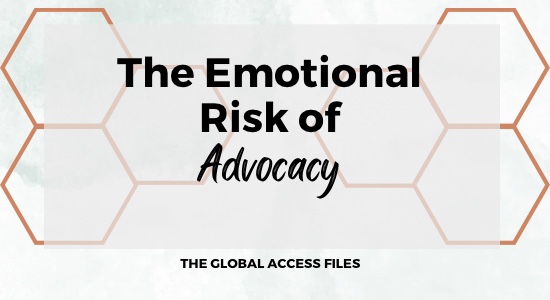Seeking new opportunities is hard. I think we can all agree on that. But when you have a disability there are often a multitude of factors that make seeking new opportunities hard in ways that the non disabled world around us doesn’t seem to pick up on.
Low expectations is part of it. But that’s only one part. The emotional responses involved are another part.
Let’s shine some light on those emotional responses so we can start to deal with them, shall we?
The inner struggle of feeling different can be a deterrent to new experiences. From personal experience it’s not about lack of self-acceptance, but rather that it’s hard being confronted with how other people view me and my abilities. Sometimes there’s that worry about how other people are going to react if I say or do something they didn’t expect.
Other people influence our decisions whether we admit it or not.
We all have unique needs but when you have a disability your unique needs are looked at differently. The way the world is set up for non disabled people often doesn’t work for one reason or another. Then we have to confront that issue and find a solution in order to have access to that part of life.
Disabled people become good at making these adaptations and sometimes don’t think much of it and do it independently. But there are times where we need to communicate our needs and ask for help. Sometimes it’s because we need assistance accomplishing a task and other times it may because we need more information about a situation or we can’t implement the accommodation alone.
In the face of a new experience sticking your neck out and starting that conversation is hard. Let’s just admit it.
It circles back to that point about being worried about other people’s reaction and the fear of not being accepted because we might need to ask them to do something for us or to do something differently than the norm.
Sometimes people are so focused on how non disabled people handle a situation that a wider variety of possibilities is never considered. As a result, disabled people must take the time to educate others about different possibilities. And that feels like an emotional risk.
It should be noted that it takes effort to educate people in any situation whether it’s at home or across the world. These situations where we are confronted with educating people who don’t think outside the box is often a common occurrence. But the reality is it’s not necessarily an easy occurrence to deal with time and time again.
As a result, we often find ourselves picking our battles and potentially the situations where we think we’ll need to explain ourselves the least.
An international experience can sometimes find itself in that category of things disabled people pass up because of the emotional risk of the necessary conversations.
If you’re participating in an international program you have to stick your neck out and let it be known that you want to participate in the program. This can feel risky because we might have to confront professionals who could be unwilling to learn and work with us and even particularly adamant that this experience wouldn’t be an option without giving it much consideration.
On the flip side you might find a professional who either already has some experience making overseas accommodations or is eager and willing to learn. Either way, there’s always some emotional risk involved.
While not sticking our head out might save us from dealing with someone who is adverse to our participation in the first place. Doing so might mean we missed out on working with someone who could have have been wonderfully helpful. Either way, we also miss out on all the new international experience could teach us.
The responses both by perspective participants and organizers comes down in large part to fear of the unknown. Fear of the unknown kills so many opportunities.
Disabled people considering new opportunities are often concerned about a lot of the same unknowns non disabled people are afraid of in those same situations. We can also have concerns about how our disabilities will affect the situation. This fear of the unknown is exacerbated when there is a lack of information that targets the details disabled people are needing to know.
We may also pick up on fear of the unknown that professionals are often experiencing. It can be intimidating to consider doing things in new ways and in the world we live in the unknowns can bring on liability concerns.
Fear can be a silent killer to new opportunities of all kinds if not properly managed.
So, how do we properly manage this fear?
We need to acknowledge the attitudes and actions that cause people with disabilities to react by not seeking out new opportunities. Not only do we need to acknowledge those negatives, we need to actively work on including people with disabilities. We need to commit to changing how we think, act and work in order to see changes in participation.
Specifically, we need to make sure we are educating ourselves on inclusion and marketing programs and services in a way that communicates inclusion and draws people with disabilities in. We need to be just as committed to the participation of people with disabilities as we are to any other demographic’s participation. That requires continued effort over a long period of time to holistically work on inclusive solutions.

